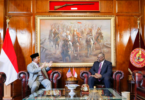Monitoring Desk
TEHRAN: The killing of top Iranian military general QasemSoleimani in a US drone airstrike has put moderate politicians in Iran at the center of storm, amid rising tension with Washington. Soleimani, the head of Iran’s Revolutionary Guards’ elite Quds force, was killed on Friday in an airstrike ordered by US President Donald Trump outside Baghdad airport.
His death marked a dramatic escalation in tensions between the US and Iran, which have often been at a fever pitch since Trump chose in 2018 to unilaterally withdraw Washington from a nuclear pact world powers struck with Tehran. “At the moment, the Iranian political elite are closing ranks behind Gen. Soleimani’s assassination but certainly the moderates have lost credibility in the eyes of the conservative establishment,” PouyaAlimagham, an Iranian-American historian and author, told Anadolu Agency.
The killing has triggered public anger and protests in Iran amid growing rejection of any efforts for dialogue and reconciliation with the US “Those who still talk about deals and pacts and make overtures to traitors (US and its allies) won’t be forgiven by history,” a protester told Anadolu Agency during a rally in Tehran on Saturday. “Today, we are all Soleimani and that means unwavering resistance against the arrogant powers,” he said.
Alimagham said the fact that Trump subverted the 2015 nuclear deal and slapped crippling sanctions on Iran has validated the conservatives and undermined the moderates. “Trump’s entire reasoning was based on the assumption that he could get a better deal,” he said. “While that was highly unlikely before Soleimani’s assassination, now it is impossibility.” According to Alimagham, the nuclear deal is now “removed from life support and is dead and buried”.
HamidrezaAzizi, a professor at ShaheedBeheshti University Tehran, opines that the moderate-hardline dichotomy in Iran’s politics will not be relevant anymore after Soleimani’s death. “All political factions are now taking an anti-American posture,” he told Anadolu Agency. “But it is too early to predict the impact of recent incident on the direction of Iran’s internal politics and the fate of [President Hassan] Rouhani administration,” he said.
Rouhani, a moderate politician, was the architect of the 2015 nuclear deal between Iran and world powers. With Iranians rallying for “revenge”, tensions have alarmingly escalated in the region with several countries reaching out to Iran to dissuade it from any retaliatory action against the US. On Saturday, Qatari Foreign Minister Mohammad bin Abdulrahman Al Thani visited Tehran and held talks with his Iranian counterpart JavadZarif.
Although Iranian authorities did not divulge details of the discussions, sources said the Qatari minister has urged Tehran to exercise restraint in the wake of Soleimani’s killing. On Friday, Iran’s top security body vowed “harsh retaliation” at the “right time and right place” to Soleimani’s killing. Soleimani’s body arrived in the southern city of Ahvaz from Iraq on Sunday and was transferred to Mashhad for a funeral ceremony to be held on Monday. The Pentagon accused Soleimani of plotting an attack on the US Embassy compound in Baghdad, and planning to carry out additional attacks on US diplomats and service members in Iraq and the region. (AA)






